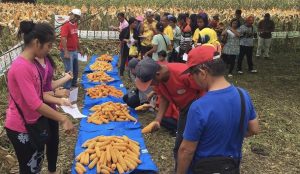In the light of the coronavirus pandemic
Can We Discuss Ag Biotech One More Time?
by Charina Garrido-Ocampo
I can actually relate to people being averse to agricultural biotechnology on the premise that it is not natural and therefore something to be vigilant, if not afraid, about. Before I became extensively exposed to scientists and agriculture experts who did ag biotech research, I pretty much perceived ag biotech in the same way. Like many, I also have an aversion to anything unnatural so that the first time I heard about agricultural biotechnology close to two decades ago, I instinctively shunned it. I simply detested the idea of scientists tampering with food for human consumption.
Incidentally, biotechnology is any technique using a living organism or parts of it to improve another living organism for a specific purpose. An example of the use of biotechnology by agricultural scientists is producing transgenic crop plants with good characters like inserting the useful Xa21 gene from an African wild rice variety into a commercial rice variety to protect the rice crop from bacterial blight, a major rice disease in the Philippines. Bacterial blight causes 15 to 50% loss in yield depending on the level of disease pressure. Such amount of yield loss makes it imperative to develop new varieties with resistance to bacterial blight if we are to meet the demand for higher production and address the problem of food security.
 The aforesaid is already a simple way of explaining biotechnology but the presence of technical jargon, which many times cannot be helped if we want a meaningful and straightforward discussion, is enough to scare anyone. Please note, however, that biotechnology is not really a new technological concept. We have long been using biotechnology in preparing vinegar, patis (fish sauce), basi (sugar cane with wine), tapuy (rice wine), cheese, bread, beer and even animal vaccines.
The aforesaid is already a simple way of explaining biotechnology but the presence of technical jargon, which many times cannot be helped if we want a meaningful and straightforward discussion, is enough to scare anyone. Please note, however, that biotechnology is not really a new technological concept. We have long been using biotechnology in preparing vinegar, patis (fish sauce), basi (sugar cane with wine), tapuy (rice wine), cheese, bread, beer and even animal vaccines.
Antibiotics such as penicillin, insulin (for the treatment of diabetes), vaccine (for rabies, hepatitis B and measles) are also products of biotechnology. We have really been benefiting from biotechnology for a long time now!
The above may still not diminish concerns about ag biotech so let me also share that agricultural biotechnology can help address challenges like the current food shortage the world is experiencing due to the pandemic. Agricultural biotechnology can immensely help not only to maximize yield so that farmers are able to harvest and earn more but it also extends shelf life, preserves nutrients and do a whole lot more!
Still holding on to that premise that it’s unnatural? This really depends on your definition of what natural is. If we strictly go by the Aristotelian concept of nature that is ABSOLUTELY without human intervention, then we can say that agricultural biotechnology is not natural. But on the other side, we have St. Thomas Aquinas, a Dominican priest and a scriptural theologian, who took seriously the medieval maxim that “grace perfects and build on nature, it does not set it aside or destroy it.” Thus, nature is not meant to be left alone but to be harnessed by human beings to benefit humanity.
Meantime, when we go to ag biotech being immoral, I am not really sure what standards are exactly being used to categorize this technology as such. It does not seem right that a technology that helps feed and cure millions upon millions of people be defined as immoral. How can saving and even improving human lives be considered immoral? To even grapple with the immorality of such a helpful, useful, life-saving technology is a painful mental exercise. Is not nature there for human beings to enhance in a moral and ethical way? It is not difficult to see that we can be overcome by all of nature’s challenges if we let nature run its normal course. Human intervention is necessary if we are to improve human life. How do you think we are able to live this long nowadays? Back in the 1800s humans live up to 30-40 years old on the average. Now, octogenarians are quite common. My own mother-in-law is 84 and is still enjoying life! Thanks to the latest medical breakthroughs brought about by human intervention.
Now, let’s move to the safety of agricultural biotechnology. Thousands of credible scientists, many of them are Nobel Peace Prize Awardees, would categorically say agricultural biotechnology is safe because it is one of the most extensively researched and reviewed agricultural developments. Ag biotech crops are studied extensively using an internationally-accepted approach to make sure that they are safe for people, animals and the environment as conventional crops are. The crops brought about by ag biotech research are the most researched and tested agricultural products in the history of mankind.
It may help to know that our own government had long manifested its support for the use of biotechnology in improving the quality and quantity of basic crops. As far back as 16 July 2001, our Philippine Government under President Gloria Macapagal-Arroyo issued this policy statement: “We shall promote the safe and responsible use of modern biotechnology and its products as one of several means to achieve and sustain food security, equitable access to health services, sustainable and safe environment and industry development.
Meantime, the Philippine Department of Agriculture (DA) has a Biotechnology Program that has funded several research and development projects in the government research laboratories to develop local products like hybrid rice, hybrid papaya and other crops.
Our population is now at 106 million and increasing. With this pandemic already seriously threatening our food supply, the projection of the increasing number of people who will go hungry this year is truly worrisome. The latest SWS survey indicated that around 4.2 million Filipino families experienced involuntary hunger for the past 3 months because of the coronavirus pandemic. The report also stated that this doubled the country’s hunger rate from 8.8 percent in December 2019 to 16.7 percent in May 2020. Meantime, food production for adequate food supply at reasonable prices has already been seriously threatened by the coronavirus pandemic. The Department of Agriculture some weeks back said that “the threat of hunger is as real as the threat of Covid-19.”
With no tangible solution yet in sight on how to address the challenges brought about by the coronavirus pandemic, perhaps it is not too much to ask those who keep a negative stance on agricultural biotechnology to keep an open mind? Ag biotech farming along with other kinds of farming can co-exist. We can support multiple approaches to agriculture to ensure that food production and supply do not get disrupted enough for the human population to go hungry. Hunger is the common enemy.
Agricultural biotechnology offers a well-studied and viable option that has already been proven safe to human beings and to the environment. If there are still doubts as regards safety, sustainability or of any key variable related to agricultural biotechnology, then perhaps it’s time we discuss anew and settle these doubts? There are those on both sides of the argument who have already agreed to disagree and gave up on further discussing the matter to seek common ground. But in the worst of times such as the coronavirus pandemic, can we still afford to do that? Perhaps it’s time to rethink and reconsider? Can we discuss agricultural biotechnology one more time?

